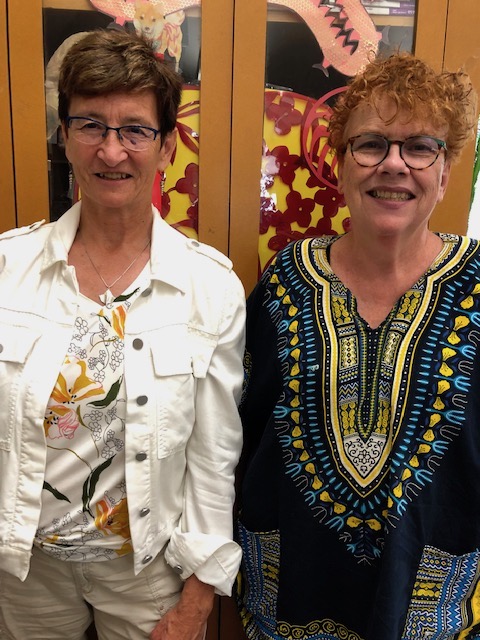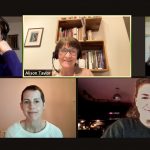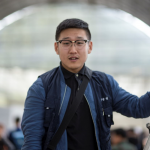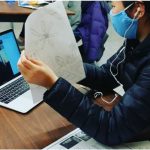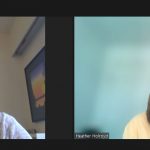By Alison Taylor
Betsy Alkenbrack and Lucy Alderson from Capilano University are down to earth. They’re passionate about adult learning. And they have a wealth of practice-based knowledge about how to work respectfully in community.
Usually, their partnerships begin with an approach from a group in the community who has heard about their work. At Carnegie Community Centre, it began with “a lot of listening and a lot of trust building.
Trust is not built by “telling and selling.” It involves informal conversations and actions that build personal relationships and demonstrate that the individuals and their organization are in it “for the long haul.”
Lucy shares the example of staying for community dinners and “doing dishes” at the racetrack in Strathcona after her “official” work hours were over so she could meet new community members and renew connections. Betsy adds that their work with a women’s leadership program with the Squamish Nation involved hanging around for cultural activities including a talking circle and then making lunch together and washing dishes.
As Lucy says, “we spend a lot of time not specifically teaching in activities that are part of the life of the organization. And if you don’t do it, you’re not seen as really in there.” Fortunately, Capilano University understands that such activities are a critical part of building collaboration.
This is good advice for university instructors like myself, and students who tend to drop in and out of community when it’s convenient. In fact, the holistic approach to adult education seems a far cry from the almost exclusive focus on intellect in university classrooms.
An area of possible convergence, however, concerns the role of instructors. Lucy and Betsy describe their work as “standing by people in their journeys of change.” For example, along with a colleague, they developed a guide on successful skills for community work called “Everything Present in the Seed”:
“This was a manual … for everybody (grade 8 level), not a community development text. And it explains the concepts, it’s giving someone who has a passion the kind of community development lingo so they can build into that conversation.”
At UBC too, a key role of university instructors is to help students become competent members within a specialist discourse community. Thus, both university professors and community educators can be seen as “discourse guides,” or “organizers of excursions into discourse communities.”[1]
Universities increasingly want their students to be multilingual—to be able to move across a variety of discourse communities as professionals. The role of instructors in organizing excursions is therefore more complex than in the past. For education students, for example, not only must instructors help them understand what it means to be a teacher in a school system. They also need to help them engage with debates, issues and voices that expand their discourse community, for example, learning more about the cultural backgrounds of their students and their lives outside of school. Increasingly, a diversity of sources of information is required to help students construct appropriate professional identities within different discourse communities.
As Betsy and Lucy suggest, regarding the role of UBC students in the DTES community, “Maybe what you should be teaching is an approach. How do you listen? How do you find out the strengths? The challenges? How do you put aside your own stereotypes?”
For university instructors, like community educators, this seems like a very good way of stimulating journeys of change.
[1] See chapter by Andy Northedge (2002). Organizing excursions into specialist discourse communities: A sociocultural account of university teaching. In G. Wells & G. Claxton (eds), Learning for life in the 21st century (pp. 252-264). Oxford, Blackwell.
